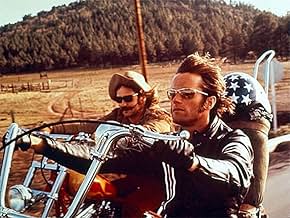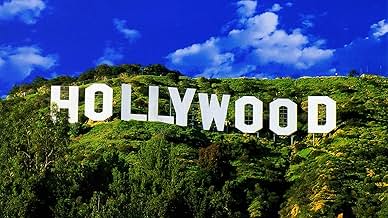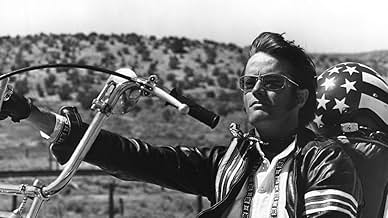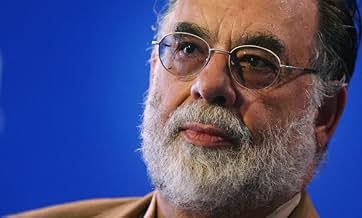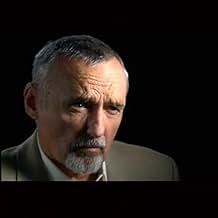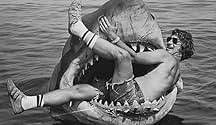Easy Riders, Raging Bulls: How the Sex, Drugs and Rock 'N' Roll Generation Saved Hollywood
NOTE IMDb
7,5/10
3,2 k
MA NOTE
Ajouter une intrigue dans votre langueA look at 1970s Hollywood when it was known as New Hollywood, and the director was the star of the movie.A look at 1970s Hollywood when it was known as New Hollywood, and the director was the star of the movie.A look at 1970s Hollywood when it was known as New Hollywood, and the director was the star of the movie.
- Réalisation
- Scénario
- Casting principal
Sam Peckinpah
- Self
- (images d'archives)
Avis à la une
The withering latter-end of 1960s cinema gave birth to a short-lived area of mainstream artistic vision - the 1970s was a decade wherein "the director was the star of the movie." I've never thought of it this way, but as the documentary points out, it's a valid and poignant summary of the time period.
This documentary - based on the best-selling book - offers an in-depth analysis of the film-making process of the 1970s... it starts out with "Easy Rider," from the late '60s, which became a huge box office success despite its profane content and extremely low budget.
The financial success of the movie seemed to spawn a new generation of artistic, low-budget films -- Scorsese and Coppola seemingly leading the revolution onwards.
Dennis Hopper would later fail with his semi-sequel to "The Last Picture Show" (as chronicled here) but other directors had success with their projects, attracting viewers despite the grungy themes of the films.
I've heard that cinema "died" in the 1970s, so far as that people had stopped going to see movies...without the influx of 1980s blockbusters, we might not have films today. I think that's rather a stretch.
If anything "Raging Bulls, Easy Riders" exaggerates the mild box office returns of the decade and tries to compensate for their low intake by citing critical praise for the films...all well and valid, when discussing the artistic merit...not financial gain.
I found this to be a rather enjoyable documentary, but I didn't learn anything I hadn't already known. It's got some good interviews, but they're not as insightful as they are amusing anecdotes.
If you are a film student, you could probably view a better and more in-depth summary of the decade; however, for novices, this is good starting ground.
This documentary - based on the best-selling book - offers an in-depth analysis of the film-making process of the 1970s... it starts out with "Easy Rider," from the late '60s, which became a huge box office success despite its profane content and extremely low budget.
The financial success of the movie seemed to spawn a new generation of artistic, low-budget films -- Scorsese and Coppola seemingly leading the revolution onwards.
Dennis Hopper would later fail with his semi-sequel to "The Last Picture Show" (as chronicled here) but other directors had success with their projects, attracting viewers despite the grungy themes of the films.
I've heard that cinema "died" in the 1970s, so far as that people had stopped going to see movies...without the influx of 1980s blockbusters, we might not have films today. I think that's rather a stretch.
If anything "Raging Bulls, Easy Riders" exaggerates the mild box office returns of the decade and tries to compensate for their low intake by citing critical praise for the films...all well and valid, when discussing the artistic merit...not financial gain.
I found this to be a rather enjoyable documentary, but I didn't learn anything I hadn't already known. It's got some good interviews, but they're not as insightful as they are amusing anecdotes.
If you are a film student, you could probably view a better and more in-depth summary of the decade; however, for novices, this is good starting ground.
A documentary like Easy Riders, Raging Bulls should be the kind of documentary I should like more. It is chock full of interviews and choice information about the time period (60's-70's) in American cinema that changed everything, for a lot better and some for not. But there are a couple of problems that become inherent. If you have read the book which spurred on the documentary by Peter Biskind (also author of Down and Dirty Pictures, a book about the 90's independent film movement), it's kind of like reading a masterpiece in the trashiest sense. There is a lot more in-depth information in the book, however much of it at the personal expense of the filmmakers, writers, producers, and others that are written about (a good deal with gossip, interestingly enough on the special features of the DVD some of the interviewees speak out against the falsities in the book, Paul Schrader being one of them). The other problem is that the same year this documentary was released on Spike TV (then later to DVD, which is where I saw it), there was the great documentary in the similar, more satisfying vein, A Decade Under the Influence. It might be unfair to compare the two, however if one were wanting in the first place to get a video history- by way of movie clips and interviews- about the years that changed movies a generation before, I would go for 'Decade' due to it's more obscure film clips, and a few more revealing and insightful interviews.
In fact, over half of the people in one documentary are also in the other, like Dennis Hopper, Paul Schrader, Peter Bogdanovich, Ellen Burstyn, Roger Corman, and Monte Hellman among others. It's not that this documentary in and of itself is not insubstantial. On a base level you get the lowdown, about how as Hollywood's studio system was on the decline, filmmakers who were coming up in Corman's enclave (Coppola, Hopper, Bogdanovich, even Scorsese), along with some other key outsiders, infused European ideals into their personal statements, making great art and some money in the process. On the level of just giving forth the information, it's not a bad telling of tales, and has a couple of interviews I wasn't expecting. But, again, my sense of proportion was out of place; I could sense that the doc, much like the book, was more interested in some of the more 'seedy' details (i.e. the stuff about Julia Phillips, or Bogdanovich, which is practically a quarter of the book) than in the actual cinema-contexts of the work. You also don't hear as much about the power of the influence on the filmmakers, which was an appeal of 'Decade'. It's not too tough a call to make, and if you've seen 'Decade' before 'Easy Riders Raging Bulls' you may agree. I liked it, but it's not saying much when the book, which itself was readable mostly for the sake of history (some worthwhile, some not), was better.
In fact, over half of the people in one documentary are also in the other, like Dennis Hopper, Paul Schrader, Peter Bogdanovich, Ellen Burstyn, Roger Corman, and Monte Hellman among others. It's not that this documentary in and of itself is not insubstantial. On a base level you get the lowdown, about how as Hollywood's studio system was on the decline, filmmakers who were coming up in Corman's enclave (Coppola, Hopper, Bogdanovich, even Scorsese), along with some other key outsiders, infused European ideals into their personal statements, making great art and some money in the process. On the level of just giving forth the information, it's not a bad telling of tales, and has a couple of interviews I wasn't expecting. But, again, my sense of proportion was out of place; I could sense that the doc, much like the book, was more interested in some of the more 'seedy' details (i.e. the stuff about Julia Phillips, or Bogdanovich, which is practically a quarter of the book) than in the actual cinema-contexts of the work. You also don't hear as much about the power of the influence on the filmmakers, which was an appeal of 'Decade'. It's not too tough a call to make, and if you've seen 'Decade' before 'Easy Riders Raging Bulls' you may agree. I liked it, but it's not saying much when the book, which itself was readable mostly for the sake of history (some worthwhile, some not), was better.
This documentary spans a period from about 1960 to 1980. The traditional Hollywood system was quickly crumbling--brought on by some incredibly expensive flops, such as "Cleopatra". And, because television had taken away from the film business so much, profits were way, way down. In reaction against the past and to help them out of financial meltdown, the studios turned their eyes to a whole new breed of filmmakers--folks who were making films that were little like the films of old. Now the new auteurs were the boss-- and in many cases they were wildly successful and in a few others they became the victims of their own egos and lifestyles. The film features tons of interviews with various Hollywood experts and craftsmen.
While I agree with some of the folks who have reviewed this documentary that many of the films mentioned in the documentary are way overrated, I cannot help but admire the overall quality of the film. It is slickly made, has exceptional graphics and is clearly a work of love. Well worth seeing--particularly if you consider yourself a film buff or expert on the medium.
While I agree with some of the folks who have reviewed this documentary that many of the films mentioned in the documentary are way overrated, I cannot help but admire the overall quality of the film. It is slickly made, has exceptional graphics and is clearly a work of love. Well worth seeing--particularly if you consider yourself a film buff or expert on the medium.
"Easy Riders, Raging Bulls" is an orgy for movie lovers. How can anyone who loves film not be in heaven at the constant parade of landmark films and key industry figures that charges across the screen in this fast-paced documentary? If you've read the book, the movie will feel cursory, and one will find himself wishing for more detail, more insider stories. There are curious omissions here, and wonders if Bowser structured his content based on who he could get to agree to interviews. Altman is hardly mentioned, Scorsese (who shows up everywhere talking about movies) is not interviewed, and Kubrick isn't mentioned at all (save for one shot of the "2001" poster). Still, what's there is great, and if you're like me, you'll be left with a twinge of sadness that such a rich time in film artistry seems to be gone forever.
Grade: A-
Grade: A-
I ran across the documentary by accident, and am really glad that I did - having been a slave to film study for the last 17 years of my life, I have read about, viewed documentaries involving, and seen the films of most of the filmmakers profiled in Easy Riders, Raging Bulls so I figured it would make for good background noise while I tended to some writing. What surprised me was that I had to postpone my work because I was literally riveted with this film.
Easy Riders, Raging Bulls chronicles the new wave of filmmakers who revolutionized Hollywood in the late 60's and 70's. While a lot of the stories are relatively well known (the foreign film influence, the problems with the filming of Jaws, the raising of the bar in terms of the box office gross) the candid commentary from the directors, producers, writers and actors that were involved was extremely enlightening and brutally honest. One story that sticks in my mind in particular is the telling by various people of the "Malibu Beach Group" that included Scorsese, Keitel, Spielberg and Paul Schrader among others gathering to party and discuss and debate film. Being a complete film geek, when friends and I get into philosophical discussions about where we would go if we could travel back in time to any moment, my answer has always been to be a production assistant on the set of Citizen Kane. After hearing this story in the documentary, transporting myself back to that scene is a close second. Supplementing these interviews were excellent behind-the-scenes footage that I had never seen of the filmmakers at work, which was absolutely fascinating.
While the documentary skips around according to genre, and not necessarily profiling a single filmmaker at a time, the range of directors presented is admirably wide. The obligatory (and famous) Coppola, Scorsese, Bogdanovch, Lucas and Spielberg are profiled with equal air time as directors who are not household names, like Sam Peckinpah, Arthur Penn and Hal Ashby. This is definitely a great documentary to catch if you want to get some ideas for films that you should watch but don't know are out there, as well as see some of the diverse portfolios the more "commercial" directors have in their pasts.
--Shelly
Easy Riders, Raging Bulls chronicles the new wave of filmmakers who revolutionized Hollywood in the late 60's and 70's. While a lot of the stories are relatively well known (the foreign film influence, the problems with the filming of Jaws, the raising of the bar in terms of the box office gross) the candid commentary from the directors, producers, writers and actors that were involved was extremely enlightening and brutally honest. One story that sticks in my mind in particular is the telling by various people of the "Malibu Beach Group" that included Scorsese, Keitel, Spielberg and Paul Schrader among others gathering to party and discuss and debate film. Being a complete film geek, when friends and I get into philosophical discussions about where we would go if we could travel back in time to any moment, my answer has always been to be a production assistant on the set of Citizen Kane. After hearing this story in the documentary, transporting myself back to that scene is a close second. Supplementing these interviews were excellent behind-the-scenes footage that I had never seen of the filmmakers at work, which was absolutely fascinating.
While the documentary skips around according to genre, and not necessarily profiling a single filmmaker at a time, the range of directors presented is admirably wide. The obligatory (and famous) Coppola, Scorsese, Bogdanovch, Lucas and Spielberg are profiled with equal air time as directors who are not household names, like Sam Peckinpah, Arthur Penn and Hal Ashby. This is definitely a great documentary to catch if you want to get some ideas for films that you should watch but don't know are out there, as well as see some of the diverse portfolios the more "commercial" directors have in their pasts.
--Shelly
Le saviez-vous
- AnecdotesMany of the subjects profiled in author Peter Biskind's book, including directors Steven Spielberg, George Lucas, Robert Altman, and 'William Friedkin', declined interviews for the documentary.
- ConnexionsFeatures L'Halluciné (1963)
Meilleurs choix
Connectez-vous pour évaluer et suivre la liste de favoris afin de recevoir des recommandations personnalisées
Détails
- Date de sortie
- Pays d’origine
- Langue
- Aussi connu sous le nom de
- Easy Riders, Raging Bulls: Comment la génération sexe, drogue et rock 'n roll a sauvé Hollywood
- Sociétés de production
- Voir plus de crédits d'entreprise sur IMDbPro
- Durée1 heure 59 minutes
- Couleur
- Mixage
- Rapport de forme
- 1.78 : 1
Contribuer à cette page
Suggérer une modification ou ajouter du contenu manquant

Lacune principale
What is the Spanish language plot outline for Easy Riders, Raging Bulls: How the Sex, Drugs and Rock 'N' Roll Generation Saved Hollywood (2003)?
Répondre

